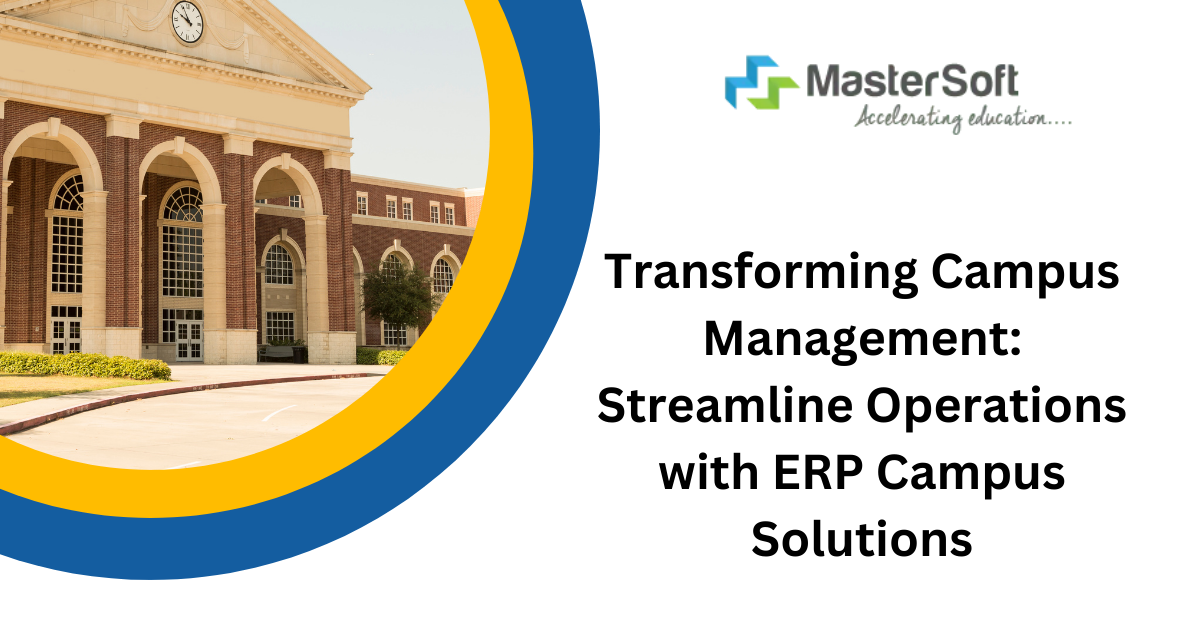Streamlining Education: The Role of ERP Campus System

In today’s fast-paced educational landscape, institutions are continuously seeking ways to enhance their efficiency and provide better services to students and staff alike. One revolutionary solution that has been making waves is the implementation of ERP campus systems. These systems, designed to streamline various administrative and academic processes, are becoming integral to modern educational institutions. In this blog, we will explore what ERP campus systems are, their benefits, and how they are transforming the educational sector.
Understanding ERP Campus Systems
ERP, or Enterprise Resource Planning, is a type of software used by organizations to manage day-to-day business activities. When tailored for educational institutions, ERP campus systems integrate various functions such as admissions, attendance, examinations, and even finance. By consolidating these processes into a single system, educational institutions can operate more efficiently and make informed decisions based on real-time data.
Key Features of ERP Campus Systems
ERP campus systems come with a plethora of features designed to address the unique needs of educational institutions. Some of the key features include:
- Student Information System (SIS): This module manages student data, including enrollment, grades, attendance, and personal information.
- Human Resource Management (HRM): This feature helps manage faculty and staff information, payroll, recruitment, and performance appraisals.
- Finance Management: This module handles budgeting, accounting, and financial reporting, ensuring transparency and accuracy.
- Admission Management: Streamlining the admissions process, this feature helps manage applications, track admission status, and handle enrollment.
- Library Management: This module assists in managing library resources, including book issuance, returns, and cataloging.
- Examination Management: This feature manages exam schedules, grading, and result publication.
- Transport Management: This module helps in managing transportation services, including vehicle maintenance and route planning.
Benefits of Implementing ERP Campus Systems
The adoption of ERP campus systems brings numerous benefits to educational institutions. Here are some of the most significant advantages:
Improved Efficiency
By automating routine tasks and integrating various functions into a single platform, ERP campus systems significantly improve the efficiency of administrative operations. This leads to faster processing times, reduced errors, and better resource allocation.
Enhanced Data Security
With sensitive student and staff information stored digitally, data security becomes a top priority. ERP campus systems come with robust security features, ensuring that data is protected from unauthorized access and breaches.
Real-time Data Access
One of the standout features of ERP campus systems is the ability to access real-time data. This enables administrators to make informed decisions quickly, track performance metrics, and respond to issues promptly.
Better Communication
ERP campus systems facilitate better communication between students, faculty, and administrative staff. Features such as notifications, messaging, and portals ensure that everyone stays informed and connected.
Cost Savings
While the initial investment in an ERP campus system can be substantial, the long-term cost savings are significant. By reducing paperwork, minimizing errors, and improving resource management, institutions can save money in the long run.
Challenges in Implementing ERP Campus Systems
Despite the numerous benefits, implementing an ERP campus system is not without its challenges. Educational institutions may face several hurdles during the adoption process:
High Initial Costs
The initial cost of purchasing and implementing an ERP campus system can be high, which might be a deterrent for some institutions, especially smaller ones with limited budgets.
Resistance to Change
Change is often met with resistance, and the adoption of a new system is no different. Faculty and staff may be hesitant to learn and adapt to a new system, which can slow down the implementation process.
Technical Issues
Technical challenges, such as software compatibility and integration with existing systems, can pose significant hurdles. Institutions may need to invest in additional IT infrastructure and support to address these issues.
Training Requirements
Proper training is crucial to ensure that all users can effectively utilize the ERP campus system. This requires time, effort, and resources, which can be a challenge for some institutions.
Overcoming Implementation Challenges
Despite these challenges, there are several strategies that institutions can employ to ensure a smooth implementation of ERP campus systems:
Comprehensive Planning
A detailed implementation plan is essential for success. This should include a clear timeline, budget, and a roadmap for addressing potential challenges.
Stakeholder Involvement
Involving key stakeholders, including faculty, staff, and students, in the planning and implementation process can help mitigate resistance and ensure that the system meets everyone’s needs.
Phased Implementation
Implementing the ERP campus system in phases can make the transition more manageable. Starting with the most critical modules and gradually adding more features can help institutions adapt more easily.
Continuous Training and Support
Ongoing training and support are crucial for the successful adoption of an ERP campus system. Institutions should invest in continuous training programs and provide resources for users to seek help when needed.
Case Studies: Successful ERP Campus Implementations
To illustrate the impact of ERP campus systems, let’s look at a couple of case studies from institutions that have successfully implemented these systems:
Case Study 1: ABC University
ABC University, a mid-sized institution, implemented an ERP campus system to streamline its administrative processes. The university faced challenges such as high initial costs and resistance from staff. However, through comprehensive planning and phased implementation, they overcame these challenges. The result was a significant improvement in efficiency, better communication, and substantial cost savings.
Case Study 2: XYZ College
XYZ College, a smaller institution, adopted an ERP campus system to manage its admissions and examination processes. Despite technical issues during the initial phase, the college invested in additional IT support and continuous training for staff. The system now provides real-time data access, enhances data security, and has improved the overall student experience.
Future Trends in ERP Campus Systems
The future of ERP campus systems looks promising, with several trends shaping the evolution of these systems:
Artificial Intelligence (AI) Integration
AI integration is set to revolutionize ERP campus systems by providing advanced analytics, predictive modeling, and personalized learning experiences. AI can help institutions make data-driven decisions and improve operational efficiency.
Mobile Accessibility
With the increasing use of mobile devices, ERP campus systems are becoming more accessible through mobile apps. This trend enables students and staff to access important information and perform tasks on the go.
Cloud-Based Solutions
Cloud-based ERP campus systems offer several advantages, including reduced infrastructure costs, enhanced data security, and easy scalability. As more institutions move to the cloud, the adoption of cloud-based ERP systems is expected to rise.
Focus on Student Experience
Future ERP campus systems will place a greater emphasis on enhancing the student experience. Features such as personalized dashboards, learning analytics, and student engagement tools will become more prevalent.
Conclusion
ERP campus systems are transforming the educational landscape by streamlining administrative processes, enhancing data security, and improving communication. Despite the challenges associated with implementation, the long-term benefits make these systems a worthwhile investment for educational institutions. As technology continues to evolve, ERP campus systems will become even more integral to the efficient operation of educational institutions, ultimately enhancing the overall educational experience for students and staff alike.
Read More Blog Here






